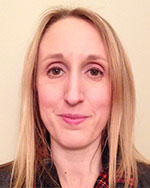Experience in Moffitt's PhD Program Supports Doctor's Love of Teaching
Dr. Victoria Bryant got her first taste of mentoring undergraduate students while working as a graduate student in the lab of Dr. Mark Alexandrow. Flash forward 10 years - she is now an assistant professor teaching first and second-year medical students and loving every minute of it.

"I enjoy interacting with my students and my fellow faculty members. I'm allowed to exercise great creativity in my teaching, and I have the freedom to work on what I want to, when I want to," said Dr. Bryant.
At A.T. Still University School of Osteopathic Medicine in Arizona, Dr. Bryant not only teaches students genetics/molecular biology, but also facilitates problem-based learning sessions, works on committees, and conducts education-based research. All of these tasks require a good amount of public speaking, which used to be Dr. Bryant’s greatest fear.
"Before starting the Cancer Biology PhD Program, public speaking was my biggest fear. However, over the course of my time in graduate school, I had to give so many journal clubs and presentations that by the time I left I wasn't scared of it anymore," said Dr. Bryant. This newfound confidence in her public speaking skills allowed her to open the door to apply for teaching jobs. She now frequently presents lectures to over 100 people and it doesn't bother her at all.
In her current position, Dr. Bryant doesn’t have access to wet labs so all research she conducts is usually education-based or clinical case study based. It is a big change compared to her graduate student days working in wet labs, but it was something she realized was a better choice for herself. It was a choice she made while creating her "like list."
"If you are unsure what to do after graduation, try simply writing a list of things you like and don't like, then find a career that matches your "like" list. When I did this, I realized that a teaching-based faculty job would be better for me than a research-based one," said Dr. Bryant. She also recommends connecting with alumni and learning about their current jobs so it can give you an idea of what you might be interested in.
If you happen to be a trainee who is specifically looking to enter a teaching-based career, Dr. Bryant offered up some great advice.
"Tailor your CV for every job type instead of using a research-focused or industry-focused CV to apply for a teaching-based job. Your teaching experience should be placed right after your qualifications on your CV, with your research experience later on." She also adds, "Adjuncting (or becoming an adjunct professor) is the best way to gain some teaching experience during postdoc so you have some to show on your CV."
If you’re interested in teaching, Dr. Bryant would be a fantastic alumnus to connect with!
Where Are They Now
- Office of Postdoctoral Affairs
- Office of Graduate Affairs
- Office of Undergraduate and Visiting Scholar Affairs
- What We Provide
- Contact Us
- Diversity in Training and Education
- About Tampa Bay
-
News
- PhD Student Julia Billington Selected to Deliver Oral presentation at AACR Conference 2024
- Team Members Share Experiences at National Postdoctoral Association Conference 2024
- Grad Student Appreciation Week 2024
- Dr. Ranjita Poudel Selected as a mHealth Scholar for Hybrid 2024 mHealth Training Institute
- Moffitt Postdoctoral Association News Recap
- State College of Florida Students Visit Moffitt Labs
- PhD Student Olabisi Osunmakinde Wins 2024 Graduate Research Symposium Presentation at USF
- PhD Student Mostafa Nasr Receives AACR Scholar-in-Training Award
- Welcome New Postdoctoral Fellow, Dr. Olivia Rose
- Moffitt Hosts Tampa Bay Chamber Collegiate Leadership Program
- Moffitt Researchers participate in the Great American Teach-In
- Dr. MacLean Hall, 2023 Outstanding Thesis and Dissertation Award
- 2024 PhD Student Visit
- 2023 Junior Scientist Research Partnership Awards
- Moffitt Innovators of Tomorrow Symposium Welcomes Its First Recruited Postdoc, Dr. Hayley du Bois
- Tumor Busters Raise Money for Miles for Moffitt
- Dr. Paulo Rodriguez Awarded W. Jackson Pledger Researcher of the Year
- RET Halloween Party and Pumpkin Carving Contest
- Ted Couch Lecture Welcomes Dr. William Kaelin
- Student Receives NCI Predoctoral to Postdoctoral Fellow Transition Award
- 2023 Junior Scientist Retreat
- 2023 Annual Student Welcome Reception
- 2023 Cancer PhD Outstanding Research Award Recipients
- 2023 Moffitt Scientific Symposium Recap
- Moffit and Saint Leo University Partner at Event
- Where Are They Now
